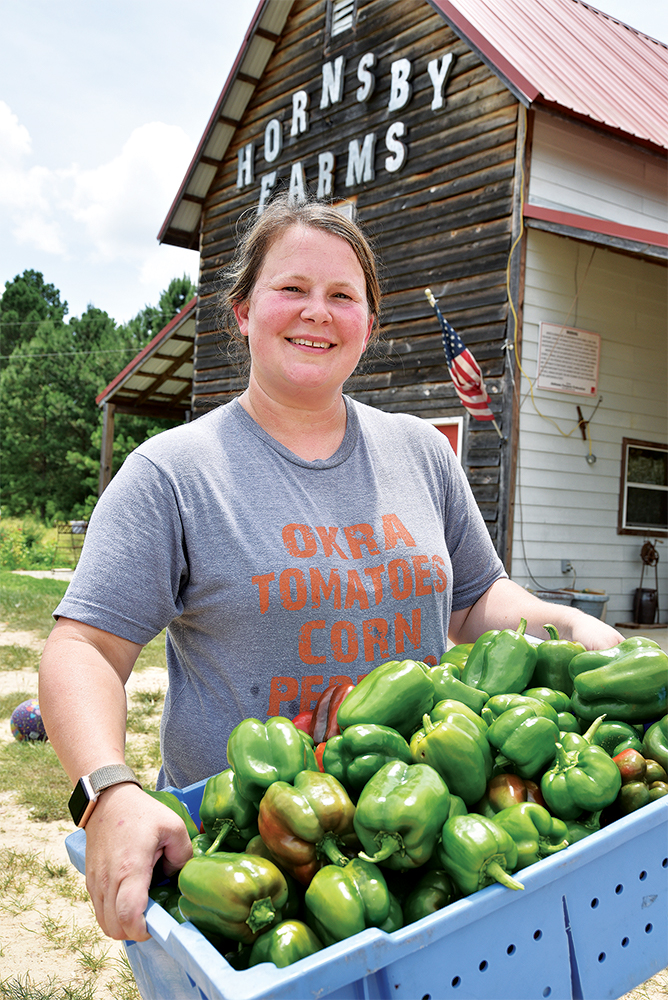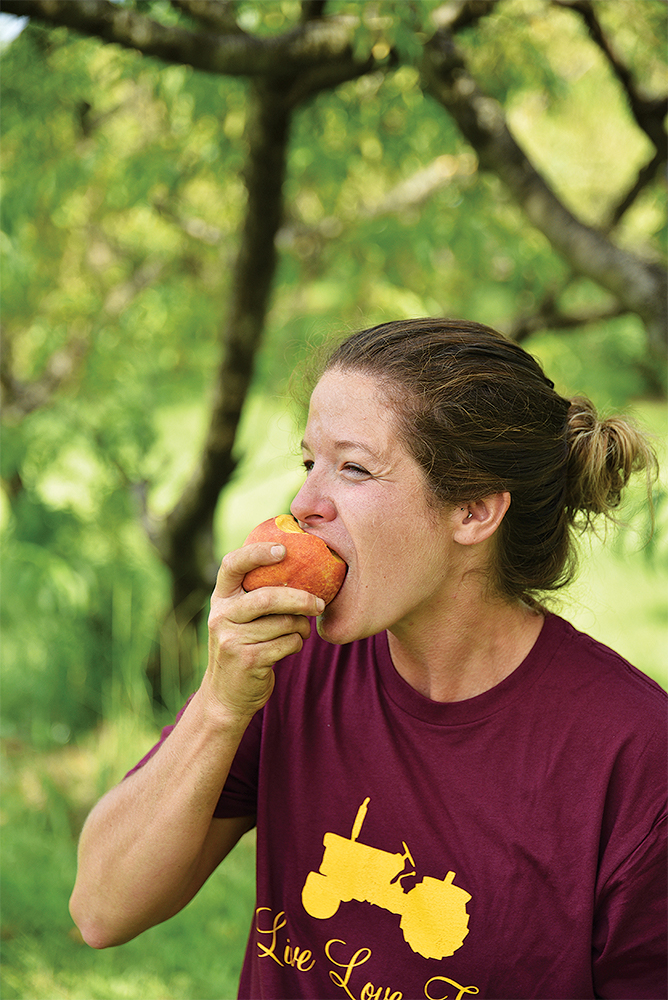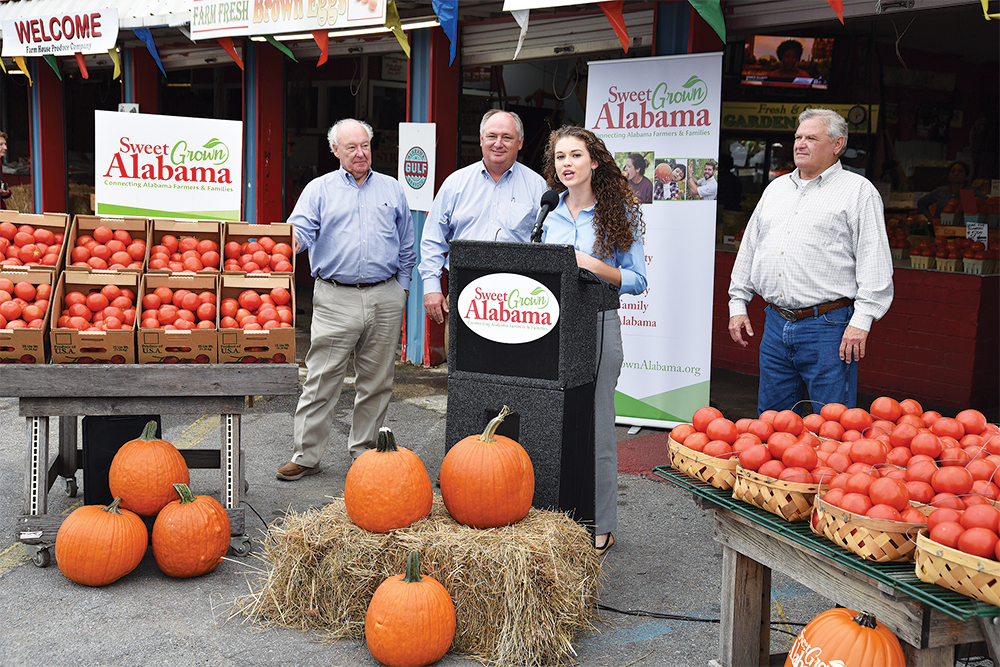By M.J. Ellington

The request that came to the Alabama Department of Agriculture and Industries in early 2019 seemed like such a simple one.
A large supermarket chain wanted to feature Alabama-grown and produced foods in its stores. The company asked for the state’s marketing slogan and copies of its logo and branding tools used for promoting Alabama agricultural products. The problem was Alabama had no coordinated program to promote its agricultural products, no logo and no slogan.
Agriculture Commissioner Rick Pate had been in his job only a few weeks when a colleague broke the news about the exciting request and the challenge it presented.
“He said, we’ve got a problem,” Pate says. During Pate’s campaign for the commissioner’s job, people kept telling him they want to know where their food comes from, so he could see the potential of such a program.
“It is such a simple thing, grown local,” Pate says. “Farmers want to grow; consumers want to know where their food comes from. How can we get them together? My role was to start the process.” He sought help from Jimmy Parnell of Alabama Farmer’s Federation and Horace Horn of PowerSouth Energy Cooperative.
About 10 years ago, Alabama attempted to develop a coordinated branding program as several states nearby have. Pate said the effort was a casualty of turf questions, but not this time.
“Once they realized this is not going to be an issue on the campaign trail, they bought in. This thing will have a million fathers,” Pate says. Other states that have adopted such a branding program have had good results, another motivation to develop the branding tools here.
By late summer 2019, the framework for Sweet Grown Alabama, a 501 C-6 nonprofit organization, was in place, dedicated to developing and operating the program. Pate, Horn and Parnell are its board of directors. Pate said he budgeted enough Agriculture Department funding to start the program with a goal to make the program self-sufficient and not dependent on future political tides.
Dream job for a farm-raised girl
Ellie Watson, an Auburn University agricultural communications graduate who grew up on a family farm in Colbert County, was hired as the director for Sweet Grown Alabama. She said the position is a dream job that had not yet been created when she finished college.
The past busy months, Watson has talked to farmers, to grocers, restaurateurs and other businesses that buy their goods and to the growing number of farmers markets. The SweetGrownAlabama.org website gives information about membership categories. Wat
son said billboards and social and print media will also help tell the program’s story.
“We will ask consumers to buy Alabama-grown food,” Watson says. She called the increased interest by consumer and grocer interest in locally grown food encouraging.

This spring, Watson expects to have a searchable website operating where consumers can find out where to buy “locally sourced” food.
“Consumers want to buy things grown here. It is fresher. It tastes better,” Watson says. There is also a local economy angle that affects consumers and farmers.
“Of every dollar spent in your community, 60 cents stays in your community,” Watson says, pointing to the goods and services that farmers and other farm goods producers buy when with the revenue they earn.
Pate and Watson both said one function of Sweet Grown Alabama will be to encourage farmers to grow more produce, to broaden the number of crops that consumers will buy here. Another will be to help farmers get good prices for their goods in the consumer market.
A hope for the future for young farmers
The people who operate family farms in Alabama are an aging population, something that Watson and Pate believe could change with the help of Sweet Grown Alabama.
“We could solve the aging-out problem if farmers could get a decent price and have sources to sell to,” Pate says.
Two young women who operate family farms in Alabama and enthusiastically became grower members of Sweet Grown Alabama think the initiative can help state farmers and consumers.
Taylor Hatchett, president of Boozer Farms in Thorsby, a member of Central Alabama EC, got into farming in 2003 by growing and selling peaches as a way to help pay her tuition costs at Auburn University. She owns and operates the vegetable, fruit and sod farm with her father, Bobby Boozer, a retired Auburn University extension fruit specialist. Hatchett believes that a state agricultural branding program is critical to the future of Alabama agriculture.
“Alabama has a beautiful history as a leader in the production of many agricultural products and goods but what we have lacked is a unified system of branding and marketing those goods to proudly display that they are produced in Alabama and/or made from products produced in Alabama,” Hatchett says.

As consumers learn more about food safety, environmental impact and local economic development, Hatchett said their desire for food grown and produced locally increases. “Consumers want access to their farmers, producers and artisans. They want to know more about the products they are eating and using and just how and where those products are produced. They want a connection to the hands responsible for growing and making the items they consume and use daily.”
On family land just outside Auburn, Beth Hornsby and her husband, Josh, established Hornsby Farms in 2013. What began as a family garden in 2008 is now a full-time working farm, and a member of Dixie EC, with 100 varieties of fruits and vegetables and a farm cannery.
“What better way to show the citizens of Alabama exactly where their food is grown and made,” Hornsby says. “For us, this means being able to connect visually with consumers by having the Sweet Grown Alabama logo on our produce packaging, as well as our sweet jams, jellies, pickles and honey.”
The branding program “will enable us to continue telling the story of Alabama agriculture and allow us to build on a great network of Alabama farms we work with every day,” Hornsby said. “When our customers purchase our products, they know they can ask us important questions about how we grow and harvest our produce and create our canned goods. They can come to us with questions about how to prepare them, find other locally grown or made items and even how to start their own gardens.”
“At the end of the day, Sweet Grown Alabama is long overdue,” Hornsby says.




